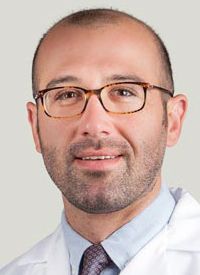Article
Early Relapse Confers Worse Prognosis After Transplant, Calling for Novel Options in High-Risk MCL
Author(s):
Peter Riedell, MD, discusses the rationale for a study in mantle cell lymphoma, the clinical implications of the findings, and unanswered questions that future research efforts should aim to answer.
Peter Riedell, MD

Early relapse within 18 months following autologous stem cell transplant (ASCT) is indicative of high-risk disease and poor overall survival (OS) in patients with mantle cell lymphoma (MCL), said Peter Riedell, MD, who added that this population should be considered for enrollment to ongoing clinical trials or novel therapeutic opportunities, such as CAR T-cell therapy.
During the 2021 ASCO Annual Meeting, Riedell presented findings from a dynamic landmark analysis evaluating the effect of time-to-relapse on OS in patients with MCL who received up to 2 lines of high-dose rituximab (Rituxan)-based induction therapy and ASCT (n = 461).
The findings demonstrated a 5-year OS rate of 69.6% and a 5-year progression-free survival rate of 45.8% in this patient population. Moreover, older patients had worse OS compared with patients under the age of 60 years (HR, 1.55; 95% CI, 1.08-2.24; P = .0191).
Notably, the multivariate analysis demonstrated that the effects of relapse on OS varied over time (P = .006). The effects were greatest at the 6-month (HR, 7.68), 12-month (HR, 6.68), and 18-month landmark timepoints (HR, 5.81).
“This is an important study that gives us a better understanding of the outcomes of patients who relapse after frontline ASCT,” said Riedell. “These data specifically looking at that question in a population of patients that underwent up-front transplant give us a better understanding of how patients who relapse early do.”
In an interview with OncLive, Riedell, an assistant professor of medicine at the University of Chicago Medicine, discussed the rationale for the study, the clinical implications of the findings, and unanswered questions that future research efforts should aim to answer.
OncLive: Could you discuss the rationale to evaluate the effect of relapse on OS in patients with MCL?
Riedell: MCL is a rare subtype of non-Hodgkin lymphoma [NHL]. In general, when we think about this disease, the outcomes can be very heterogenous. Essentially, the standard treatment approach for a large majority of patients is intensive induction therapy followed by consolidative ASCT in the frontline setting.
However, a proportion of patients do not benefit from that treatment approach long term. Through this study, we wanted to take a deeper dive into understanding that. Particularly, [we wanted to] look at the time-to-events and time-to-relapse and its effects on OS in this patient population.
What patients were included in the analysis, and what methods were employed to evaluate the primary end points?
For this study, we evaluated adult patients who were treated with up to 2 lines of rituximab-based induction therapy, followed by frontline ASCT. We only included patients who received transplant within 1 year of their diagnosis, so we were trying to capture a more homogenous population. We evaluated patients who were transplanted between the years of 2000 and 2018.
In terms of the primary outcomes, we were looking at OS and post-relapse OS. Additionally, through this analysis, we employed a dynamic landmark analysis at 6-month intervals to evaluate the effects of relapse on OS while adjusting for pertinent patient- and disease-related variables.
What was noteworthy about the findings?
A few interesting points were noted. Through the CIBMTR [Center for International Blood and Marrow Transplant Research] database, we found a number of unique data points. One of the things that we found that was interesting to us was that when employing a multivariate analysis, we were able to see that the effects of relapse on OS did vary with time and [the effects was specifically the greatest at the early time points after undergoing an ASCT. For reference, those patients who relapsed by the 6-month, 12-month, or 18-month landmark timepoints after ASCT, had the worst outcomes overall.
Additionally, patients who were of older age—which was defined as 60 years or older—had worse OS at the various landmark timepoints. That is consistent with other previously published data.
What are the clinical implications of these findings?
There have certainly been data that have been presented in other subtypes of NHL, particularly follicular lymphoma, that gives us a sense of the timing of relapse and how that may affect outcomes long term.
Particularly, those [patients] who relapse by the 18-month landmark timepoint after transplant have a very poor OS. These patients likely require different therapeutic approaches in the frontline setting or, more so, in the relapsed setting compared with our conventional treatment. By novel approaches, I am getting at things such as inclusion in currently enrolling clinical trials or the utilization of CAR T-cell therapy.
What questions have been left open-ended from this analysis?
One of the limitations of this dataset is the fact that we were not able to glean all the now-known risk features of MCL, such as Ki-67 proliferative index and MIPI [Mantle Cell Lymphoma International Prognostic Index] score. Things like that were unfortunately not available for the analysis. Those data points would be very helpful for us to get a better understanding of who these patients are who relapse early. How can we better identify them on the frontend in order to potentially alter our treatment strategies to, ideally, have longer-term benefit?
That is one of the areas where the field needs to move: to better understand which patients relapse early and subsequently, [determine] what therapies we can employ in those patients who have those high-risk features, who are not served as well with up-front ASCT.
Reference
- Riedell PA, Hamadani M, Ahn KW, et al. Effect of time to relapse on overall survival (OS) in mantle cell lymphoma patients following frontline high-dose therapy and autologous hematopoietic cell transplantation. J Clin Oncol. 2021;39(suppl 15):7521. doi:10.1200/JCO.2021.39.15_suppl.7521









